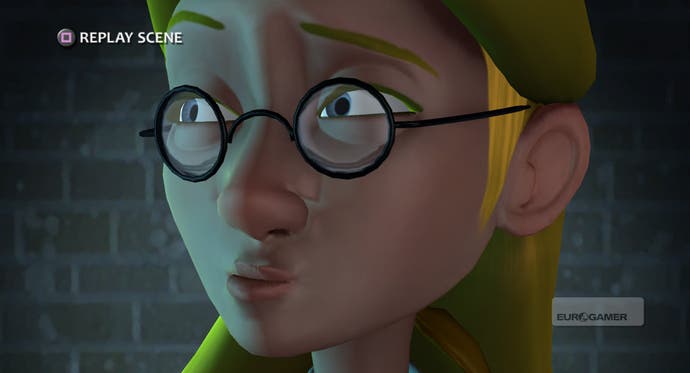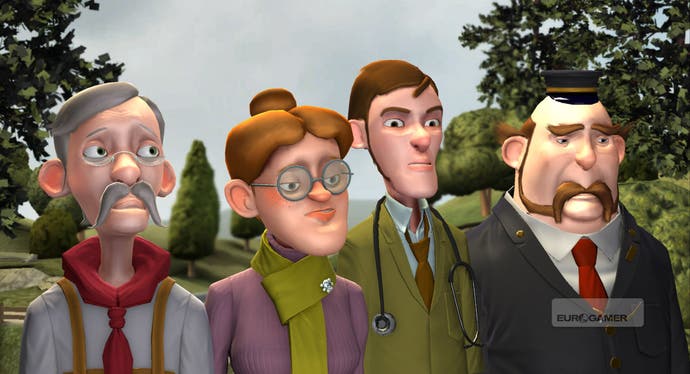Blue Toad Murder Files: Season One
File and forget?
Even better than Relentless' idea of what a family game should be is its idea of what a family itself should be. Mum, dad, perhaps a granny or a weird uncle: all gathered in the living room on a Sunday afternoon, wanting nothing more than to play on the PS3 together. They're not intimidated by PSN, they're not fazed by online stores and virtual wallet purchases, and when they reach for the DualShock, ready to pass it back and forth for an hour or so, they're after a game that will give them puzzles, a rambling cast of eccentrics, sprightly cliff-hangers, and a gentle, twisting narrative - all handled with a modest gift for ghoulishness.
And so the house of Buzz! built the Blue Toad Murder Files, a series of episodic whodunits as sugary and consequential as a few slices of cake. It's a nice idea, to see the fusty world of Marple and Morse delivered, with button prompts, on a semi-regular schedule. It's a nice world that's been created, too: a comical sprawl of Englishness, where vital clues may lurk in broken pieces of shortbread, and unsuspecting villagers are mown down in a flurry of champagne-cork gunshots. Each new instalment promises an hour of self-contained family fun, and there's a central narrative, albeit one that forms a tangle rather than a smooth-soaring arc, to keep you coming back for more.

Granted, the execution has perhaps been a little bumpy. Both developer and audience have struggled to work out exactly how much you should charge for an hour of fun - and, given the basic tenets of the murder mystery, there isn't a great deal of replayability on offer either, unless you're the kind of person who drives to work in your pyjamas and has trouble remembering what you named your children. Neither problem has proved terminal, however: on the first issue, Relentless has been very willing to experiment with pricing, even offering the odd episode for free. As for the second point, well, a few slices of cake are hardly replayable either, and nobody seems to mind too much about that.
Coasting leisurely through the finished series (all six episodes are now available for the eminently reasonable price of £20) is a chance, at last, to get a sense of Blue Toad's overall shape. It's hard not to like what you find, too. The six hour-long episodes mean Relentless' mild-mannered distraction is now comfortably lengthier than Modern Warfare 2's single-player campaign (and significantly lighter on incidents of the phrase "Oscar Mike") while, perhaps more importantly, its general tone makes for a welcome break from the norm.
While so many other games may be built from rigid-body physics and the brain-splattered heft of the Unreal Engine, Blue Toad appears to have been constructed entirely out of Lady Grey tea and the Home Service. Coming off as a cross between a stage play, a quiz show, and a handful of different board games, Relentless wants you to turn genteel detective, and quietly ferret out murderers most foul in a fairly peaceful manner.

As you wander around the village of Little Riddle, investigating vicious crimes while solving the maths, spatial, and lateral-thinking puzzles that regularly cross your path, Professor Layton may be the most obvious touchstone. And yet, somewhat bizarrely, it's not really the most relevant. Played with three friends wedged onto the sofa and the living room loud with griefing and wild speculation, it becomes obvious that Relentless has actually made something unique.
Not only is there no privacy whatsoever as you fail to complete a puzzle everyone else has solved instantly, while the clock ticks on and the in-game announcer mocks you with an elaborate turn of phrase, but the game also balances its audience's desire for co-operative or competitive gaming effortlessly by letting you make all the important decisions yourselves. Individual challenges can be handled solo or collaboratively with no repercussions for the wider game, while the greater puzzle lurking in each episode's tortuous plot is perfect for secret deductions or noisy deconstruction.








